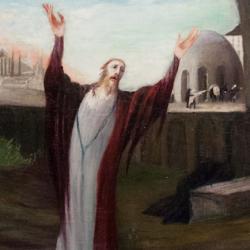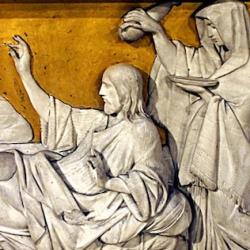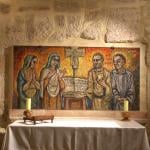When Jesus tells Peter to forgive “seventy times seven” times, He is only alluding to the climax of God’s dealings with Israel that Daniel prophesied; he is He is also is alluding to Lamech, who threatened to avenge himself “seventy-sevenfold” (Genesis 4:22-23).
Lamech was the descendant of Cain. Cain was the first murderer, a fratricide. His brother did him no wrong, but instead of confessing his sin to his brother and seeking reconciliation, he killed his brother. He then established a city, a community, which was founded on the blood of an innocent brother.
Lamech is in this tradition, and he takes the Cainite legacy and expands it. Genesis 4 tell us, “Lamech said to his wives, ‘Adah and Zillah, listen to my voice, you wives of Lamech, give heed to my speech, for I have killed a man for wounding me; and a boy for striking me; If Cain is avenged sevenfold, then Lamech seventy-sevenfold.” He makes vengeance the ruling principle of civilization. He establishes a city of vengeance.
This is a fundamental principle of civilization throughout history. The blood feud is the way order is maintained in antique Greece (see Aeschylus, Oresteian Trilogy); it’s still there in the Renaissance (Hamlet); it’s there in early America (Hatfields and McCoys). You can keep things relatively peaceful through vengeance. If everyone is ready to respond to violence with massive counter-violence, then everyone will think twice about wronging each other. But once a wrong is done, then it can’t be stopped. Once a wrong is done, then the blood continues to flow until there’s no one to stop it.
We’re fooling ourselves if we think that we’ve outgrown the instinct to be a Lamech. We all want to lash out at people that wrong us. When your wife or husband embarrasses you, you want to get him back. When your parents are too demanding, you want to make them pay 77fold for wounding you; and much of our discipline of our children is vengeance against them for the shame and embarrassment they cause us. At work, in school, in social life – Lamech is very much alive.
Jesus’ allusion to Genesis 4, though, indicates that He is establishing a new kind of city. Jesus alludes to the Canite institution of vengeance, but He is telling Peter that His city, His kingdom, His brotherhood, is not characterized by vengeance but by forgiveness. It will be characterized not by settling scores and evening things out, but by canceling debt and releasing. Forgiveness is the opposite of vengeance, and the city of Jesus is not to a Cainite city of vengeance but a city of expiations. Jesus’ brotherhood is not Cainite, where brother kills brother for nothing; it is not a Lamechian city where vengeance reigns supreme. Jesus tells Peter that he is founding a city, a brotherhood, where pardon reigns supreme.
This also gives us a hint about what forgiveness actually is in practice, what forgiveness requires. Peter is to be the opposite of Lamech, forgiving 70 x 7 instead of taking 77-fold vengeance. Forgiveness is the opposite of vengeance. Forgiveness is the determination to put aside vengeance, and to be reconciled to a brother.
Forgiveness is not mainly about our feelings. It’s not a matter of having kindly feelings for a person who wronged us. We should have compassion and kind feelings for those who wrong us, but this is not what forgiveness is. Those feelings are products of forgiveness, but it is a product that may come long after we have granted forgiveness. We may well struggle with all kinds of ill feelings even after we have forgiven someone.
From the perspective of Genesis 4, forgiveness is about putting aside vengeance. Someone treats you badly; you could do something to equalize that – treating them badly, slandering them, spreading the story of their mistreatment, looking for opportunities or creating opportunities to do something that hurts them as much as they hurt you, or hurts them more. Forgiveness means giving up all that. It means laying aside all plans to even the score. It means ceasing to be a Lamech.
Forgiveness is the form that brotherhood takes. It is the form of life in the church. It is not, as it were, an end in itself. Forgiveness is for the purpose of restored communion, for the purpose of reconciliation. Forgiveness is for the purpose of brotherhood, of restoring broken brotherhood. We might even say that forgiveness is brotherhood, the form that brotherhood takes in a sinful world. Pardon reigns supreme where brothers confess their sins to brothers, where brothers confront brothers, where brothers forgive brothers. That’s the way Jesus’ brotherhood is supposed to live.
Forgiveness is the ground of brotherhood is another way as well. Lamech’s life is determined by his past. Communities founded on blood feud can never do anything new. They just keep doing the same thing, over and over and over again. A city of vengeance is a city of repetitive cycles, a city without any possibility for renewal. But that’s not what Jesus’ brotherhood is. Jesus’ brotherhood is a new creation. A community of forgiveness is, you might say, a community whose life is not determined by the past, by what has happened. It is a community that has a future, that embodies the possibility of new creation.











